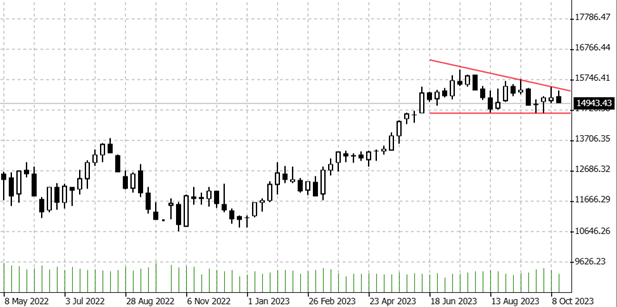

Quelle: Bernstein Bank GmbH
20.10.2023 – While the Middle East conflict continues to smoulder, a surprising turnaround has occurred in the USA: Jerome Powell has signalled a longer pause in interest rates than he has done in a long time. In view of looming risks, the move could be a small help for the financial market. Especially the bulls in high-tech stocks are likely to be grateful. Which is also due to a word from London.
With a little imagination, a triangle formation can be seen in the weekly chart of the Nasdaq 100. This means that the market is probably heading for a decision. Interestingly, the Bank of England has just commented on tech stocks, as Finanzen.net reported. In an unusual move, the Financial Policy Committee said that given the impact of higher interest rates and because of uncertainties around inflation and growth, valuations of some risky assets appeared to be stretched. In other words, a correction is imminent.

Source: Bernstein Bank GmbH
Which brings us to the Federal Reserve. In his speech yesterday to the Economic Club of New York, Fed Chairman Powell gave the usual on the one hand and on the other. Nevertheless, the moderate tones stuck. The always well-informed “Wall Street Journal” said: “Fed’s Jerome Powell Signals Extended Pause in Rate Rises”. The latest economic figures pointed to an ongoing process of lowering inflation while maintaining strong employment.
Specifically, Powell said, “indicators of wage growth show a gradual decline toward levels that would be consistent with 2 percent inflation over time.” He added: “Doing too much could also do unnecessary harm to the economy.” He also commented on bond yields: “Financial conditions have tightened significantly in recent months, and longer-term bond yields have been an important driving factor in this tightening. We remain attentive to these developments because persistent changes in financial conditions can have implications for the path of monetary policy.”
Too much at once
The market was dominated by the assessment that perhaps too much is going wrong at the moment. Above all, concerns about a conflagration in Israel are weighing on minds. In addition, the Leading Economic Indicators (LEI) of the Conference Board in the USA slipped for the 18th time in a row – in September, they fell by 0.7 percent month-on-month, compared to the expected minus 0.4 percent. Meanwhile, sales of pre-owned homes fell to their lowest level in 13 years. It is little consolation that the month-on-month decline was only 2 per cent, compared to the 3.7 per cent drop that had been expected. But year-on-year, this was still a plunge of 15 per cent.
Our conclusion: Perhaps the latest word from the Fed was the signal for a complete end to tightening. If there is a recession that is mild and if external shocks such as a major war in the Middle East do not materialise, this should at some point bring about a new buying mood. Only when? Bernstein Bank wishes you successful trades and investments!
_____________________________________________________________________________________________________________________________________________________
The content of this publication is for general information purposes only. In this context, it is neither an individual investment recommendation or advice nor an offer to purchase or sell securities or other financial products. The content in question and all the information contained therein do not in any way replace individual investor- or investment-oriented advice. No reliable forecast or indication for the future is possible with respect to any presentation or information on the present or past performance of the relevant underlying assets. All information and data presented in this publication are based on reliable sources. However, Bernstein Bank does not guarantee that the information and data contained in this publication is up-to-date, correct and complete. Securities traded on the financial markets are subject to price fluctuations. A contract for difference (CFD) is also a financial instrument with leverage effect. Against this backdrop, CFD trading involves a high risk up to the point of total loss and may not be suitable for all investors. Therefore, make sure that you have fully understood all the correlating risks. If necessary, ask for independent advice. CFDs are complex instruments and are associated with the high risk of losing money quickly because of the leverage effect. 68% of retail investor accounts lose money trading CFD with this provider. You should consider whether you understand how CFD work and whether you can afford to take the high risk of losing your money.7
